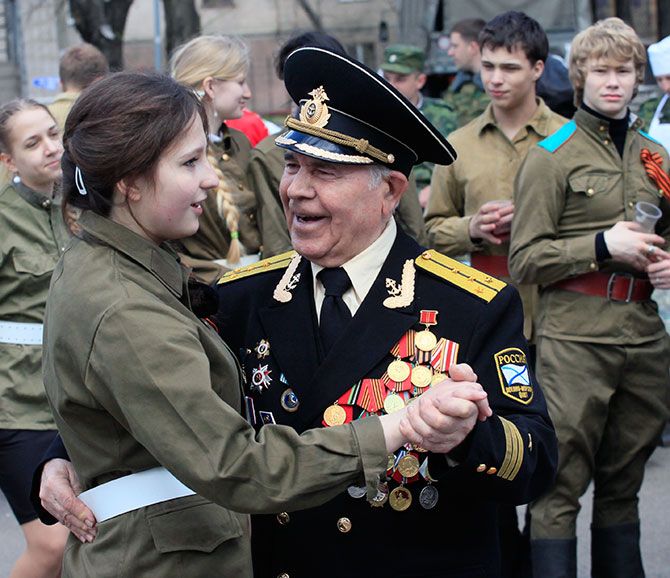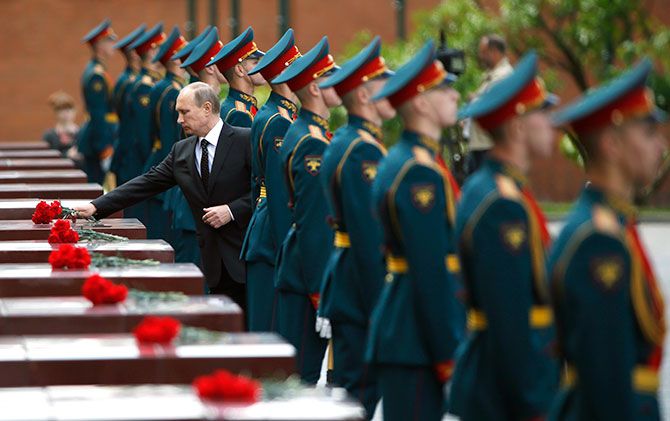'The Russians had risen to great heights of sacrifice and heroism and won a victory against Hitler and Nazism at such a tremendous cost in spite of being weighed down by the tyranny and oppression of Stalin.'
'The casualties suffered in the war were so heavy that in the Soviet days there was a ritual of taking a newly married couple to the war memorial in each town and village immediately after the wedding. The implication was that they should have many children to make up for the lost population.'
Rediff.com re-posts the late K Subrahmanyam's memories of Victory Day that commemorates the end of World War II.

I was sixteen years old when the Second World War ended in Europe. Though I was a keen war watcher we did not have a radio in our house and therefore the sources of news for me was The Hindu delivered at my house and the local municipal reading room.
I was then a resident of Tiruchirappalli some three hundred kilometres to the south of Madras. The morning paper that we got was printed in Madras the previous evening. So I got the news of the German surrender some thirty hours late.
While our papers covered the German surrender to General Dwight Eisenhower on May 8, 1945 elaborately, the surrender next day to the Russians was not covered so extensively. Years later I saw it in the six-part serial -- The Great Patriotic War produced by the Soviet Union.
The brief ceremony of the German general's surrender and his curt dismissal was not something that made a lasting impression on me unlike the hoisting of the Red flag on the Reichstag building in Berlin, a few days earlier.
On May 9, 1982 I was in Moscow and had an opportunity to celebrate VE Day (Victory in Europe Day, when the Allies celebrated the defeat of Nazi Germany on May 8, 1945) with the citizens of Moscow. Two colleagues from the Oriental Institute accompanied me that day and acted as my guides as I was the guest of the Institute.
One was Professor Tanya Shaumian and the other was Dr Alexander Chicherov, both specialists on Indian studies. That day was an unforgettable experience. Public traffic had been suspended for the day and the whole of Moscow was in the streets celebrating the victory that was earned at the cost of millions of lives, both military personnel and civilians.
We were in Gorky Park and there were tens of thousands of people milling around. There were hundreds of poles planted with streamers with names of various military units that served during the Second World War. Around each pole had gathered veterans belonging to that unit with their families.
Thirty-seven years had passed since the end of the war. The youngest person present who had served in the war was in the mid-fifties. But each gathering had people of all ages, children and grandchildren of the veterans. They were all in a celebratory mood, singing, chatting, eating, drinking and dancing.
Occasionally there would be an outburst of applause. I found out that was the way the crowd greeted a 'Hero of the Soviet Union' passing by, who was identified by his medal. All veterans were wearing their medals on that day but this medal stood out, as it should have, since it was the highest military honour.
Naturally our conversation turned to the very heavy casualties suffered by the Soviet Union and the blunders committed by Stalin, particularly the execution of senior Soviet military leaders before the outbreak of the war on trumped-up charges.
One name stood out among Stalin's victims, Marshal Tukachevsky. His house used to adjoin Professor Shaumian's apartment block on the bank of the Moscow river on the opposite side of the Kremlin.

Professor Shaumian's grandmother was the widow of a senior Armenian Communist leader executed by the white Russians during the civil war in the twenties. Therefore, her family lived in that apartment originally allotted to her grandmother. There is a novel on Stalin's purges in the thirties called The House by the River since many of Stalin's victims were residents of that apartment block.
I raised the question how was it that so many of Stalin's victims, especially military men and scientists who when released from prison and assigned straightaway to combat duties or weapon related R&D carried out their task with extraordinary devotion and skill without any rancour against Stalin. The answer was they were supremely patriotic and were loyal to Mother Russia in spite of Stalin's tyranny.
I could believe it, having been to Leningrad (now St Petersburg) and seen the military museum. There is a display of the bread ration (125 grams per person) issued to the people during the long German siege. It would not be adequate even for a child. Yet the people of Leningrad bore that suffering and did not surrender. They lost nearly 50 per cent of the population to starvation and cold. The siege of Leningrad for 900 days has been celebrated in a symphony by Soviet composer Dmitri Shostakovich.
The casualties suffered in the war were so heavy that in the Soviet days there was a ritual of taking a newly married couple to the war memorial in each town and village immediately after the wedding. The implication was that they should have many children to make up for the lost population.
In 1982 one could not anticipate the demise of the Soviet Union. For an Indian from a democracy, the Soviet Communist system was not attractive though the Soviet people were warm and friendly. The Soviet Union as a nation had extended to India military and political support. It had contributed significantly to Indian development.
However, on that VE Day, walking among the Muscovites, more than anything else, I was overwhelmed by a sense of reverence and awe. These were a people who had risen to such heights of sacrifice and heroism and won a victory against Hitler and Nazism at such a tremendous cost in spite of being weighed down by the tyranny and oppression of Stalin.
Even Stalin had to call it 'The Great Patriotic War' and not a war to defend Communism.
K Subrahmanyam, one of India's leading strategic affairs thinkers, passed away in 2011. This article first appeared on Rediff.com in May 2005.
REDIFF RECOMMENDS











 © 2025
© 2025